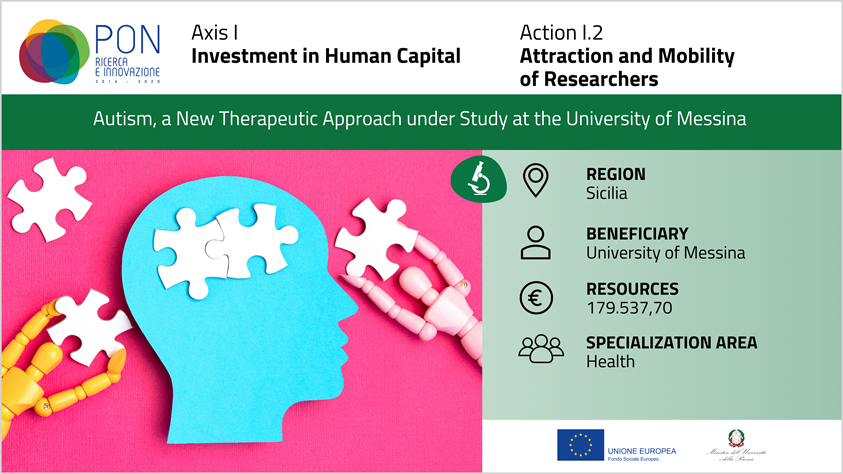Notizie correlate
Non ci sono notizie correlate.
Autism, a New Therapeutic Approach under Study at the University of Messina

ITA | ENG
Project
The research project carried out within the Department of Human Pathology in Adult and Developmental Age “G. Barresi” at the University of Messina involves one researcher and falls within the Health specialization area.
The study aims to expand knowledge of the molecular, genetic, immunological and biochemical mechanisms underlying Autism Spectrum Disorder (ASD) in order to develop novel diagnostic and intervention strategies. A careful clinical characterization of patients will be carried out in order to correlate specific subgroups with different developmental trajectories, different responses with different rehabilitation and pharmacological treatments. The newly acquired knowledge will lead to the identification of new biomarkers that will help clinicians in the diagnosis and prognostic evaluation of neuropsychiatric disorders in children (response and non-response to rehabilitation therapies), while helping them to define the prevalence of known etiopathogenic conditions and improve the therapeutic strategies for each patient (personalized medicine based on pathogenesis).
Financial Resources
The project is funded by the NOP Research and Innovation 2014-2020 under Action 1.2 “Researcher Mobility”, Notice “Attraction and International Mobility of Researchers” (AIM) with a total budget of 179.537,70 euro for the recruitment of one researcher under a fixed-term contract.
Impact
The project is part of a process strengthening a clinical area of great medical and social impact. ASD is a complex and severe developmental condition for which there are currently no pharmacological therapies able to modify the nuclear symptoms of the disorder. The social and health costs of ASD are estimated to be 1.4-2.4 million dollars in the US, mostly related to rehabilitation of patients and productivity losses of parents who have to care for their sick children, to say nothing of the costs for adult individuals who rarely manage to secure long term employment. If targeted pharmacological or rehabilitation interventions were able to improve the IQ in children with autism, it is estimated that around 500.000 euro would be saved for each “low-functioning” child developing with a normal IQ. Research in the field of Child and Adolescent Neuropsychiatry is of fundamental importance to improve quality of life for patients and contain health and social costs by developing novel targeted treatment for each case.
11/08/2021








